The constant quest for new routes to educational success turned the EIN of Viladecans into a 2017 URBACT good practice. Since then, the possibility of undertaking an innovative project like ON BOARD has enabled a shared learning community to be created with five European cities which consider education to be the backbone of their local policies: Nantes (France), Tallinn (Estonia), Albergaria-a-velha (Portugal), Poznan (Poland) and Halmstad (Sweden).
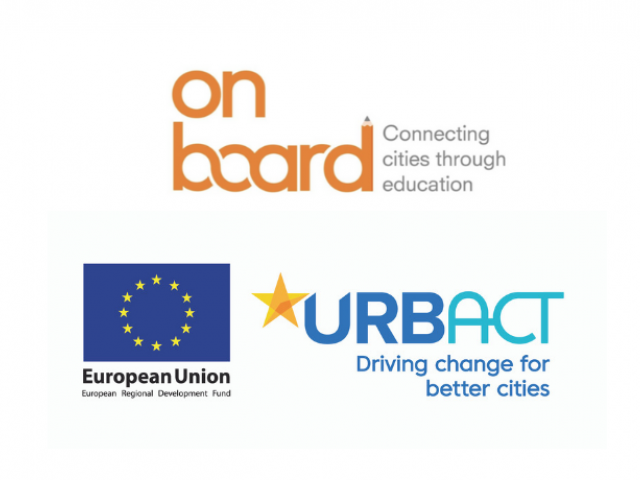
A PROJECT LED BY VILADECANS
ON BOARD, which is part of the European URBACT programme and is co-financed by the European Regional Development Fund, is a project led by Viladecans whose mission is to adapt and transfer the Educational Innovation Network (EIN) to other participating cities in order for them to adapt it and create their own educational innovation network within a two-year period. For Viladecans, the lessons learned from its participation in the ON BOARD project should help it develop a plan to improve the current EIN.
This exchange of experiences and knowledge among towns also entails the creation of different “URBACT Local Groups” with local agents, which should help the five European partner cities define how to adapt the EIN to their local contexts, while also helping Viladecans prepare a roadmap of the EIN for the forthcoming years.
THE KEYS OF THE PROJECT
The six cities participating in this project are Viladecans (coordinator), Nantes (France), Tallinn (Estonia), Albergaria-a-velha (Portugal), Halmstad (Sweden) and Poznan (Poland).
The main objective of the project is to transfer the EIN to five European cities which also focus on fostering educational innovation through cooperation with local agents.
The Educational Innovation Network (EIN) is a space of cooperation spearheaded by the Viladecans City Council, where the public administration, teachers, families, companies and local entities interact and work to foster innovative projects in the city’s schools.
The partner cities are not alone as they attempt to define and implement the plans to transfer the Educational Innovation Network to their regions. They have all created a group of local agents (called Local Support Groups), where representatives of the public administration, teachers, families, companies, entities and other prominent actors participate in the process of adapting the EIN to their local contexts.
Months total length of the project, from 4 December 2018 to 4 December 2020
European partner cities: Viladecans (coordinator), Nantes, Tallinn, Albergaria-a-velha, Halmstad and Poznan
International gatherings
Euros in the project’s budget
Local support groups
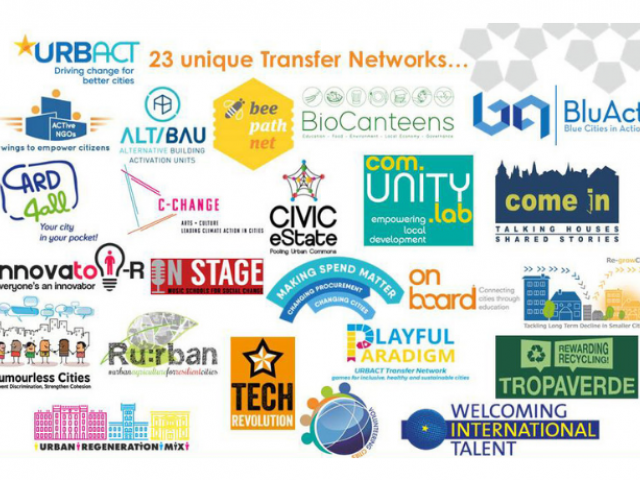
URBACT TRANSFER NETWORK
ON BOARD is one of the 23 Transfer Networks approved by the URBACT programme in Europe. In addition to the transfer of the good practice to other cities, the objective of the URBACT Programme is to document the cities’ experiences in the process of adapting the good practices. URBACT aims to define and make available to all European cities a methodology which helps them adapt experiences which have been successful in other cities to their regions while saving resources.
Education is facing major challenges today. We often hear that 21st-century children are still learning with 20th-century methodologies. The ON BOARD project seeks to contribute to updating the educational processes in order to equip our youths with the tools and skills they need to rise to the new labour and social needs.
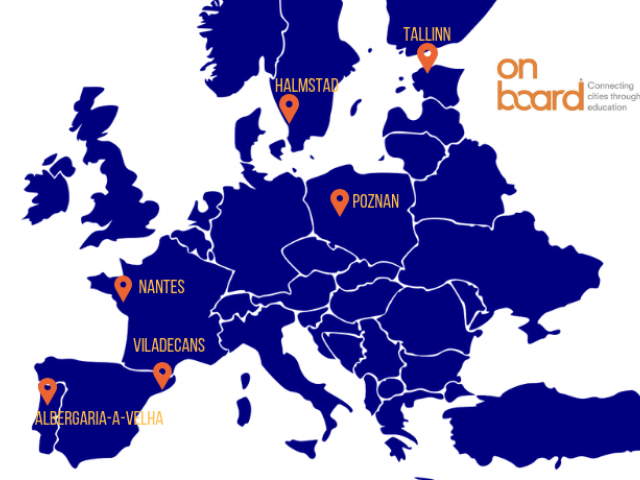
6 PARTNER CITIES
The six cities participating in this project, Viladecans (coordinator), Nantes (France), Tallinn (Estonia), Albergaria-a-velha (Portugal), Halmstad (Sweden) and Poznan (Poland), share the idea that local governments, regardless of their authority over education, are key actors in the education of their citizens. The local administrations have privileged knowledge of the local agents; the city’s opportunities and needs; and the economic, social and cultural framework of the city which they can make available to educational leaders, schools and teachers so that they can turn these needs into real opportunities for their students.
The ON BOARD cities share the desire to foster educational innovation and the conviction of the need to get local agents involved in order to achieve richer, more relevant and more meaningful learning processes which bear local realities in mind. And they see the EIN as a valuable tool to foster this cooperation among local agents and create an ecosystem of educational innovation.

THE LOCAL SUPPORT GROUPS
Just as with the EIN, the establishment of Local Support Groups that bring together agents from all the sectors involved in education (teachers, families, companies, politicians, etc.) in all the cities is a key ingredient. This is why the establishment of these groups was a priority in the first phase.
During the first few months of the project, these groups will define how they will adapt the EIN to their cities by developing what is called a “Transfer Plan”. In Viladecans, the city where the good practice originated, the Local Support Group will work on the four strands to improve the EIN: the empowerment of youths in the educational process, the definition of clear indicators to measure the impact of the network, the addition of new kinds of members (entities, museums, libraries, associations, etc.) and the future sustainability of the network.
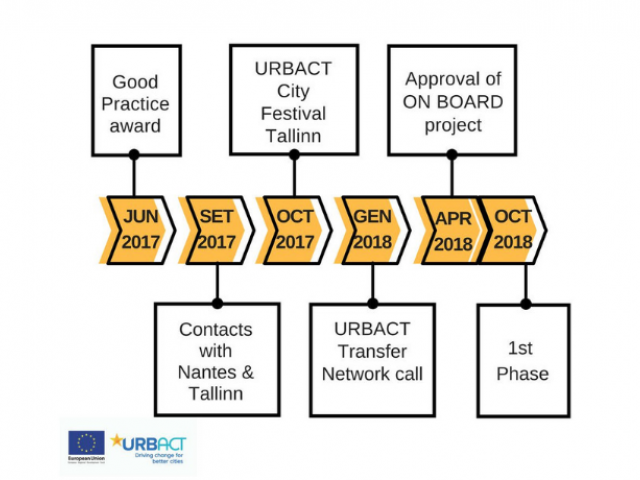
DEVELOPMENT - Phase 1
During the first preparatory phase of the project (4 April to 4 October 2018), the initial ON BOARD cities (Viladecans, Nantes and Tallin) defined the working programme in the second phase (4 December 2018 to 4 December 2020). The main objective of these initial meetings was to expand the partnership along with other European cities, to fully understand what the EIN is and to establish a roadmap to define the actions to be carried out during the two years that the project lasts.
The different meetings held in phase 1, as well as the expertise in executing URBACT transfers of Mireia Sanabria, who has assisted us throughout this entire process, enabled an exhaustive study to be conducted of each city’s capacities to adapt the EIN in order to adapt it to and materialise it in the partners’ different educational realities in phase 2.
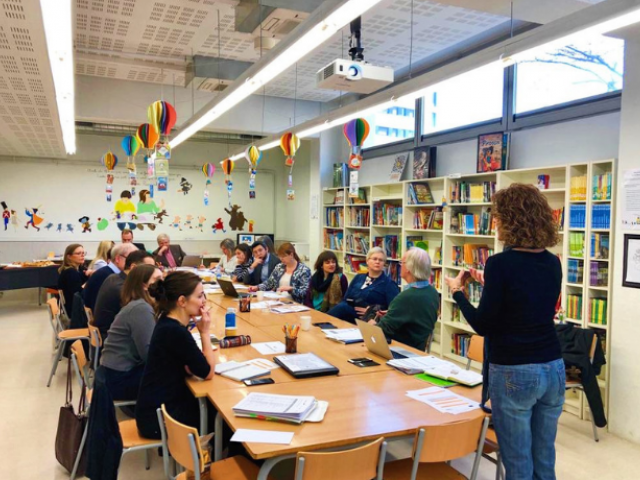
DEVELOPMENT - Phase 2
On the 5th of December 2018, URBACT announced that the ON BOARD project to transfer the Educational Innovation Network would have a second phase.
February, the kick-off gathering was held in Viladecans, where the municipal representatives of the six cities signed a document to state their cities’ stances on education and educational innovation. The document also contained the commitments of the different local governments in relation to the transfer of the Educational Innovation Network within the next two years.
The participants were able to meet the main players and learn about the EIN projects firsthand, and they began to work on the knowledge transfer process of the experiences of all the cities.
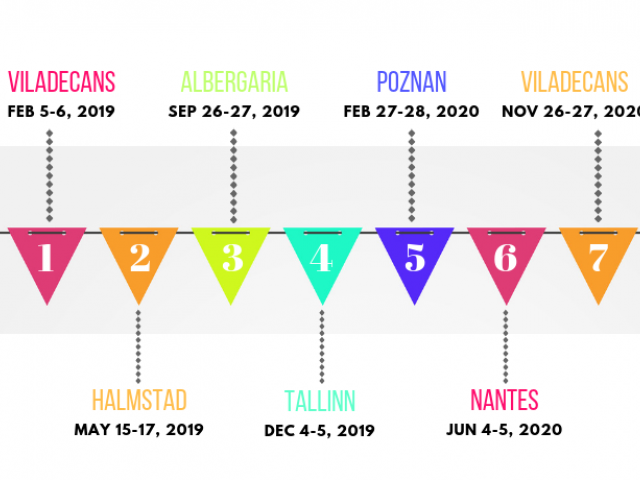
Phase 2 - Next Steps
This is the first of seven meetings planned to be held in the different partner cities. At each of them, different components of the EIN needed to transfer the network will be discussed.
For the two years remaining in the project, the 5 European cities will have to design and begin to implement a transfer plan of the Viladecans Educational Innovation Network in their regions. In turn, Viladecans’ participation in the project should enable it to use the knowledge from other European cities to help its Local Support Group to define an improvement plan for its Network in the forthcoming years. With ON BOARD, the six partner cities thus begin a process of exchange and mutual learning.
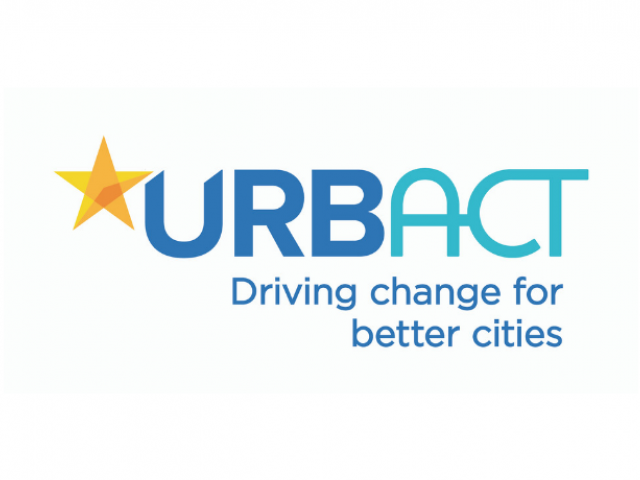
What is URBACT?
URBACT is an EU programme whose objective is to foster integrated and sustainable urban development in European cities. The programme is co-financed by the ERDF, the 28 Member States, Norway and Switzerland.
URBACT’s mission is to foster joint work among the cities in order to develop comprehensive solutions to common urban problems through exchange and learning from other cities’ experiences.
More information: www.urbact.eu


